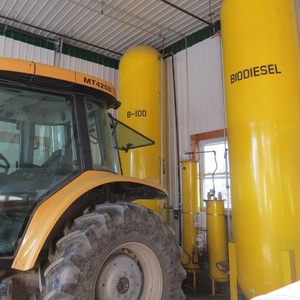New report available for on-farm biodiesel production in Vermont

Photo: Vermont Bioenergy Initiative
February 26, 2016
BY The Vermont Bioenergy Initiative
A new report, On-Farm Biodiesel Production in Vermont: Legal and Regulatory Overview, conducted by the Institute for Energy and the Environment at Vermont Law School reviews all Vermont state and federal regulations related to on-farm biodiesel production. Commissioned by the Vermont Bioenergy Initiative at the Vermont Sustainable Jobs Fund, the report aims to inform farmers about the potential laws and regulations surrounding on-farm biodiesel production.
“As statewide partners begin to find new ways to achieve the goals of Vermont’s Comprehensive Energy Plan, which identified biodiesel as a fuel that will help Vermont meet the 10-percent renewable transportation goal for 2025, the On-Farm Biodiesel Production in Vermont report provides a timely review of the regulations that pertain to home-grown biodiesel production,” stated Ellen Kahler, executive director of the Vermont Sustainable Jobs Fund.
Advertisement
According to the report’s findings, “while several of the federal regulations are only triggered by high levels of production, there are a number of state laws and regulations that may be triggered by small-scale biodiesel production, such as state air emission provisions that establish lower thresholds when compared to the federal Clean Air Act. In addition, it is critical to understand the role biodiesel production plays in the definition of ‘farm’ and ‘farming activities’ for the purpose of states laws, such as Act 250 and the Current Use Program.”
IEE Global Energy Fellow Carla Santos coordinated the legal review with contributions from fellow IEE researchers Diana Chace, Christopher Cavaiola, Jeannie Oliver and Jeremy Walker. The report is broken into five chapters that review tax legislation, site regulations, occupational safety and health, registration and environmental legislation.
“Our institute’s research should help Vermont farmers understand the regulatory hurdles to producing biodiesel on the farm and help them convert a locally grown resource into economic and environmental benefits for Vermont,” said VLS Professor Kevin B. Jones, IEE deputy director.
Advertisement
IEE researchers applied the legal review to three potential scenarios in the report, concluding with a convenient and accessible list of “do’s and don’ts” for farmers to use as a legal checklist as they move forward with producing biofuel in on-farm operations.
The complete report is available on the Vermont Bioenergy Initiative website along with a variety of additional biofuel relevant reports and resources.
Related Stories
The U.S. EPA on July 8 hosted virtual public hearing to gather input on the agency’s recently released proposed rule to set 2026 and 2027 RFS RVOs. Members of the biofuel industry were among those to offer testimony during the event.
The USDA’s Risk Management Agency is implementing multiple changes to the Camelina pilot insurance program for the 2026 and succeeding crop years. The changes will expand coverage options and provide greater flexibility for producers.
President Trump on July 4 signed the “One Big Beautiful Bill Act.” The legislation extends and updates the 45Z credit and revives a tax credit benefiting small biodiesel producers but repeals several other bioenergy-related tax incentives.
CARB on June 27 announced amendments to the state’s LCFS regulations will take effect beginning on July 1. The amended regulations were approved by the agency in November 2024, but implementation was delayed due to regulatory clarity issues.
SAF Magazine and the Commercial Aviation Alternative Fuels Initiative announced the preliminary agenda for the North American SAF Conference and Expo, being held Sept. 22-24 at the Minneapolis Convention Center in Minneapolis, Minnesota.
Upcoming Events










